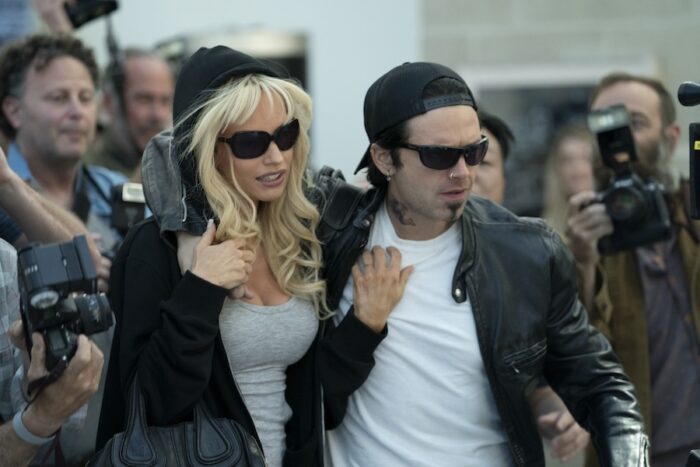First look UK TV review: Pam & Tommy
Review Overview
Cast
8Complicity
5Consent
5David Farnor | On 02, Feb 2022
From A Very British Scandal to The Trial of Christine Keeler, TV in recent years has been increasingly turning its gaze back on itself, re-evaluating the way that the media presented notable scandals of the past – and highlighting the misogynistic narratives that framed events for generations of viewers. Pam & Tommy, Hulu’s eight-part drama about Pamela Anderson (Lily James) and Tommy Lee (Sebastian Stan), is the latest to reframe recent history, and its critique of 1990s sexism is as brash and explicit as its subject matter.
The series begins in 1995, as carpenter and electrician Rand Gauthier (Seth Rogen) is fired halfway through a renovation job on a bedroom in the couple’s mansion. Thousands of dollars in debt, having not been paid for his work or reimbursed for supplies, he returns later to pick up his toolbox that he forgot – only to be threatened at gunpoint and ordered to leave the estate without his own belongings. Rand decides upon what he thinks is a fair retort and breaks into their home and steals their safe. Inside? A home video that Lee and Anderson filmed on their honeymoon.
Audiences today probably don’t need to be told what happened next, as the names Pamela Anderson and Tommy Lee spark recollections not only of their scandalous divorce but of their even more scandalous tape that was published online – a brazen invasion of privacy, let alone theft, that raises all kinds of questions around consent. Except, of course, at the time, those questions were buried underneath salacious headlines.
Pam & Tommy succeeds at bringing some nuance to this sensationalist story, firstly by orienting the opening episode around the experiences of Rand. Played by an almost unrecognisable Seth Rogen with an everyman’s bad luck, we’re led to sympathise with his war against the wealthy, taken in by his moral righteousness and firm belief in justice. (“I am karma,” he declares to the camera at one point, at once cementing his role as an equaliser and a deluded exploiter of other people for his own gain.)
The second episode takes us firmly to the other side of the fence, and makes us believe in the star couple’s relationship, with its four-day whirlwind from dating to getting hitched on the beach. It also manages to turn Tommy Lee – a hedonistic cartoon character of a man, played with astonishing energy and abandon by a career-best Sebastian Stan – into a likeable human. He’s bowled over when he meets Pamela, finding in her more grounded background and worldview a calming presence that makes him want to settle down with her. And, of course, they’re both incredibly attracted to each other.
That back-and-forth is, at times, enough to give you whiplash, and the show doesn’t always manage to balance its show-all-sides-of-the-situation approach – something not helped by Craig “I, Tonya” Gillespie’s exuberant direction, which goes all-in on the graphic 90s-MTV-style elements, to the point where the show wants to have its cake and eat it (Tommy talks to himself in one overlong, indulgent scene). But there’s also style aplenty on display – Gillespie has never met a cool needle drop he didn’t like – and a recurring motif of tracking zooms that give us the sense that we’re peering into, and intruding upon, these people’s private lives.
It’s slightly odd, then, that the programme itself also feels like that’s happening on a wider creative level, as writer Robert Siegel based his drama on a magazine article about the scandal, without Anderson’s approval or endorsement. Those concerns are alleviated to some degree, though, by Lily James’ heartfelt performance as the Baywatch star. She disappears into the role, taking it beyond imitation (the make-up and hair are seamlessly accurate) to tap into the frustration felt by the actress, who was perpetually a piece of collateral damage – even in this situation, caused by the bullying behaviour of her husband and the revenge ambitions of another man, helped by his friend in the adult film business (the always-excellent Nick Offerman).
Episode 3, tellingly, feels like the show has found its groove, as it tones down the smut and allows Anderson to take centre-stage, exploring the narrative that she wants to tell about her own life, as she looks to move her career away from running along the beach – just as Rand is rolling out his tapes on the nascent world wide web. It’s a layered and compassionate take on Anderson’s position and career, and tees up a show ready to grapple with the ethical and legal issues at hand. If, that is, it can avoid getting too distracted by its own salaciousness.



















